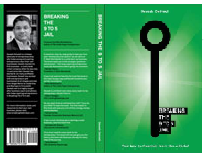Employee Turned Entrepreneur – Colin Wright
Posted Under: Entrepreneurship, Our Heroes
Today under the “Our Heroes” series I would like you to meet Colin Wright, a young designer who became fed up with the social hierarchy and heavy demands which characterized the corporate realm. So, with the thrill of starting up a business and creating a product that others joyfully consume, Colin created his own design studio. Let’s delve deeper into Colin’s blueprint story…
 DD: Who are you and what kind of corporate job were you at?
DD: Who are you and what kind of corporate job were you at?
CW: I’m Colin Wright, a 24-year-old designer who worked as a Creative for a multidisciplinary design and production studio in Los Angeles. Being a Creative essentially means I would come up with the look and feel of most projects, consult with the clients on the direction of their accounts, and do everything from designing and building websites to directing commercials.
DD: What made you leave the job? When did you realize that you wanted to be an entrepreneur & why?
CW: I left the job because the corporate environment was starting to ask far too much of me. I took the job right after college so that I could learn how a studio operates on a larger scale from what I had experienced before, and what I learned is that largely they do their best to drain the client of money while giving the least amount of value back in exchange. Even in boutique studios, a person’s position in the social hierarchy allows them to make changes to other peoples’ work, regardless of their lack of expertise in a given field, and employees are forced to work hours far beyond what they are being paid for.
I realized I wanted to be an entrepreneur long before I started up the studio job. At 19 I started my first business – a culture magazine – and after that I started up my first studio. Neither one was an epic monetary success, but the thrill of starting up a business and creating a product that others joyfully consumed was huge for me, and dealing with all aspects of running my companies helped me figure out that I would never be content as just another cog in a larger machine.
DD: What did you do to break the corporate jail? How did you prepare yourself for the employee to entrepreneur transition?
CW: I knew that I would eventually leave the corporate world before I took the job after college. That in mind, I started up a blog that forced me to keep creating and refining my skills. I created an illustration, a photograph and a piece of short writing every single day that I worked in the corporate world, and putting that out into the world and knowing their were people waiting for it each day kept me going.
I also involved myself in as many side projects as possible. To this day I’m still a part of a handful of start-ups and always have at least a few personal projects (that might someday turn into businesses) floating around the outskirts of my day.
DD: What are your Top 5 tips for employees who want to be entrepreneurs but are hung up on something?
CW: 1) Your sub-conscious will do everything it can to keep you from quitting and starting up your own business. That part of your brain just wants stability and predictability, and it will help you come up with all kinds of logical-sounding excuses not to take any risks. Don’t listen to it. Just jump.
2) Stay true to your values and personal style. If you try really hard to make yourself fit into everyone else’s mold, then what value do you have? You’re just a cookie-cutter version of everyone else at that point. Being unique (and even a bit strange) is GOOD for your business. It is what makes you stand apart.
3) Don’t focus so hard on one thing that you exclude everything else. Part of why I was able to start my studio and get a bunch of clients right away is that I had a double-handful of skill sets to offer. I didn’t just design, I also developed website, created illustrations, built marketing and social media strategies and consulted on sustainability. Each new skill you acquire increases your value (and the value of your other skills) tenfold.
4) Know what you’re getting yourself into. Do as much research as possible on business and marketing and self-promotion and anything else you think might come in handy. I can’t tell you how many times a little tidbit I picked up from a random book has saved me thousands of dollars.
5) Don’t be afraid to talk about yourself. When you’re an entrepreneur, you live or die based on who knows about you and what you do. If you can talk about yourself and your accomplishments in everyday conversation without sounding like you’re bragging, you’re in a great spot. The best way to market is to not market at all…so long as a lot of people know what you do, the work will come to you, so that you don’t have to spend so much time and money going out to find it.
DD: How are you now? Are you still in same business, and how do you feel?
CW: I’ve never been happier than I am right now. I currently run my branding-focused design studio from a new country every 4 months and I run a popular lifestyle design blog (my readers vote on which country I move to next). I’m learning a lot and meeting all kinds of wonderful people. My business is flourishing and I’m finally able to invest more time in myself, making travel and acquiring more experiential knowledge a big part of my life.
DD: Wow! What an intriguing story! Especially the part about moving to a different country every 4 months! That is incredible. Thank you so much for sharing your story with me and I wish you the best of luck in the future.
CW: Thank you, Devesh, for having an interest in entrepreneurs and for understanding what we do. I am grateful for all of the support I get and I am thankful for the people who understand entrepreneurship and let me do what I do and be happy while I do it. I also wish you the best of luck.
DD: Colin Wright everybody, an entrepreneur who has created a successful branding-focused design studio and lifestyle design blog. He got a real look inside the corporate life and decided that it was not for him. And remember what Colin said: “Stay true to your values and personal style”. That is one very important thing for every entrepreneur to keep in mind because that is what sets you apart from the rest.
Success to all!





